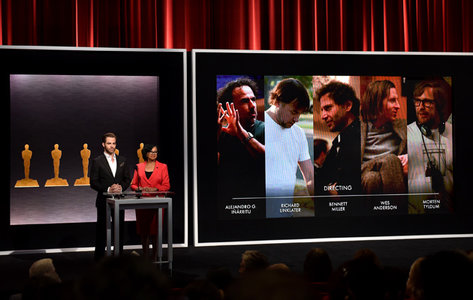Andrew Rostan was a film student before he realized that making comics was his horrible destiny, but he’s never shaken his love of cinema. Every two weeks, he’ll opine on either current pictures or important movies from the past. Today he’s joined by fellow film student Alex Bean to opine on the 87th Academy Award nominations.
What Andrew Disliked
Bean, let’s deal with the disappointments first. There was plenty of work I thought should have gotten nominated: the Academy continues to scorn Steve James and Kartemquin Films, The LEGO Movie couldn’t get a spot in Best Animated Feature, and Timothy Spall and our favorite bridesmaid Amy Adams missed out on acting nods.
These complaints seem petty when one realizes the nominations reveal how much AMPAS remains a welcome refuge for old white dudes. During the broadcast this morning, the one movie that kept getting the most cheers was Clint Eastwood’s American Sniper, which tallied six nods including Best Picture despite having severely problematic racial and political viewpoints. Another BP nominee, Ava DuVernay’s Selma, has become one of the most renowned movies of the year. It is by all accounts an impeccable, deeply moving picture about one of the greatest Americans who ever lived. Its failure can be put down to pointless hand-wringing over historical details, Paramount dropping the campaign ball…and not wanting to support a film directed by a black woman which talks about white racism the way we should be talking about it. This is a stark reminder that the Academy, despite increasingly honoring truly visionary productions, still has a long way to go.
This leads to my last and greatest peeve. DuVernay missed a chance for Best Director. So, thankfully, did Eastwood. But in their place was MORTEN TYLDUM. Let me reiterate: The Imitation Game was a TERRIBLY directed movie with no individual style, bad framing, bad editing, bad construction…Alan Turing could have programmed a machine to direct a better movie than Tyldum. His being there at DuVernay’s expense is godawful.
I welcome your further elaboration on these points…and the addition of your own gripes!
What Bean Disliked
2014 was a year where generations of social and political progress suddenly seemed like a chimera. From the twin travesties of Ferguson and Staten Island to the Republicans sweeping to power everywhere but the Federal Executive Branch, it was hard not to watch the news last year and feel that the arc of history really was bending towards justice. As you’ve alluded to already, Andrew, Hollywood decided to double down on that this morning. This year’s slate boasts the first all-white set of acting nominees in decades and the first all-male set of writing and directing nominees since 1999. That’s a problem.
The issue is not just what movies are up for the Oscars, though. It’s what those nominations say about the industry being honored. Hollywood is now what it always has been: overwhelmingly white and male at every level. As Vox pointed out today, the average Academy voter (which is a good representative sample of Hollywood’s elite) is a 63-year-old white man. The vast majority of executives, producers, directors, and writers are white men. The vast majority of roles for actors in movies are male, and even the female roles that do exist tend to be mute or seen purely as sexual objects.
Demographic imbalance that bad as a lot of effects, including scaring people who don’t fit the profile away from the industry, but for our purposes it has led to a distressingly monochromatic and phallic set of Oscar nominees. Look at the Best Picture lineup, where only one of the eight nominees has a female lead (The Theory of Everything‘s Felicity Jones). Even that role, though, is as a supportive wife to a suffering white male genius. The demographic imbalance is betrayed here in the fact that male-centric movies are made more often and treated more seriously.
The Best Actress category is an even more garish give-away of this fact. Out of five nominees, only two of their films got any other nominations: the aforementioned Theory of Everything and Wild, which got its only other nomination in…Supporting Actress. The takeaway here is either that there are so few good female roles that the Academy must nominate performances from mediocre movies or that the Academy just doesn’t care as much about women’s stories. Either is damning.
What Andrew Liked
All of the above (which further sadly reminded me that there were no female nominees for writing or cinematography either) makes it really tough for me to launch into positive thinking…until I remember why I fell in love with movies and still love them. They have the ability to transport us into new places and make us forget the problems of the world with excitement and laughter. I want to dwell on laughter because the Academy so often pays comedy little heed, but this year the two most-nominated films were comedies which grabbed nine slots apiece: The Grand Budapest Hotel and Birdman. The current favorite for Best Picture, Boyhood, had its own set of light-hearted moments. I still need to see the first two, but Boyhood may end up my favorite film of the year for its combination of epic ambition and magnificent content.
Indeed, what I loved most about this year’s Oscars was that Wes Anderson and Richard Linklater received three nominations each for Original Screenplay, Director, and Picture. I have loved Linklater ever since seeing School of Rock and Before Sunrise. I’ve come to love Anderson, after a long time dismissing his work, because Moonrise Kingdom made me understand it. I have always admired both of them for spending decades making movies with highly personal visual styles, a willingness to let characters talk, and an encouraging, optimistic, heartfelt point of view that embraces the flaws, the absurdity, and the joys of life in a way that reminds us to be aware of these joys even in the darkest moments. A victory for either of them will be truly great.
A few more: the British Scientist Biopics were flawed at best, but their four leads were outstanding and deserved these spots, as did the frightening, frighteningly excellent Steve Carell. I’m thrilled that Paul Thomas Anderson was nominated for the highly idiosyncratic Inherent Vice screenplay and Johan Johannsson can repeat his Golden Globes win for The Theory of Everything‘s concerto-like score. Above all, even though Cheryl Boone Isaacs flubbed his name, I was overjoyed that Dick Pope received one of four nominations for Mr. Turner. His extraordinary cinematography, which was more akin to two and a half hours of paintings coming to life, more than deserved a nomination and will be remembered long after yesterday’s trending joke fades away.
So while contemplating that Alexandre Desplat got as many or more nominations than some films, take us home, Bean. What did you throw your support behind?
What Bean Liked
For all my griping up above, I do actually have a lot to be happy about. My four favorite films from 2014 (The Grand Budapest Hotel, Boyhood, Whiplash, and Selma) were all nominated for Best Picture, which is some kind of amazing. So let me count up the happy things real quick.
Like I mentioned last month, my great hope for the season was that Grand Budapest would get some love. I would not have guessed, though, that it would look like this. Anderson’s film has shown up everywhere in the precursors, culminating in a Best Picture win at the Golden Globes last week, and then boom. Nine nominations, including Best Picture and a Best Director. For someone as idiosyncratic as Anderson to be embraced without changing his style is very heartening. The only thing missing was a nomination for Ralph Fiennes, but the Academy decided to make zero interesting choices in Lead Actor. Can’t win ’em all.
Boyhood is a film you and I have both praised on here, so I’ll just say that it’s nothing short of amazing that a movie so small and intimate appears to be the runaway favorite for Best Picture. Kudos to Linklater and his team for working so well for so long. The rewards they are reaping are quite richly deserved. Whiplash is, like Boyhood, another tiny Sundance film hitting above its weight-class in nomination count. It’s much darker than Linklater’s film, but deserves this attention just as much. Damien Chazelle directed the fuck out of this movie, and J.K. Simmons, in the role that will net him an Oscar next month, created a character that is both a near-demonic villain and a fleshed-out and understandable person. If they ever film Blood Meridian he is my choice to play Judge Holden. Maybe Chazelle should direct?
Selma is a great and timely piece of American political film making. I’ll have a full review up on Monday, so for now all I will do is join the chorus. This movie was fantastic and right up the Academy’s alley. That they failed to give it more than two token nominations in Picture and Song is a shame and one that will not be forgotten for decades. But at least it made the Picture field. I guess that will have do.
Pictures from Flavorwire, Empire Online, Collider, and cinematographers.nl









I had higher issues on my mind, so I’ll rant a little bit more specifically here.
* Birdman is a stylish movie with good acting and absolutely nothing insightful in its silly little head. That it is being nominated, much less winning, awards for writing makes me woeful about our species.
* The Imitation of Everything is a pair of movies so bland as to defy belief. I don’t know why they were made with absolutely no imagination or courage, but that people seem to like them that way is also cause for despair. I hope they win zero Oscars.
* I’m gonna review American Sniper soon, but that movie looks like the most vile, racist, jingoistic piece of shit that I can hardly wait to rip it to pieces. Super thrilled that it surged to 5 nominations while Selma sank.
I WILL HAVE MORE RANTS IN THE FUTURE!
One thing we can agree on is that The Imitation of Everything is the opposite of great. Imitation is horrible beyond Cumberbatch and Knightley, and Theory would have been a better movie if it wasn’t a Stephen Hawking biopic, if that makes sense.
And right in between finishing and editing, I saw “Ida,” which is a perfect miniature of a film which carries a lot of weight. The cinematography is ultra-distinctive, unusual, and helps build things to an overpowering point.
Well, so much for open-minded transparency in our work…
I don’t understand this comment.
Based on this and your other recent writings which I read today, can I make a friendly suggestion? Spend more time watching movies and less time writing about the films you haven’t seen.
I am genuinely confused by this comment. The only movie neither of us have seen that gets mentioned here was American Sniper. Are you just roaming the internet hectoring people about that movie?